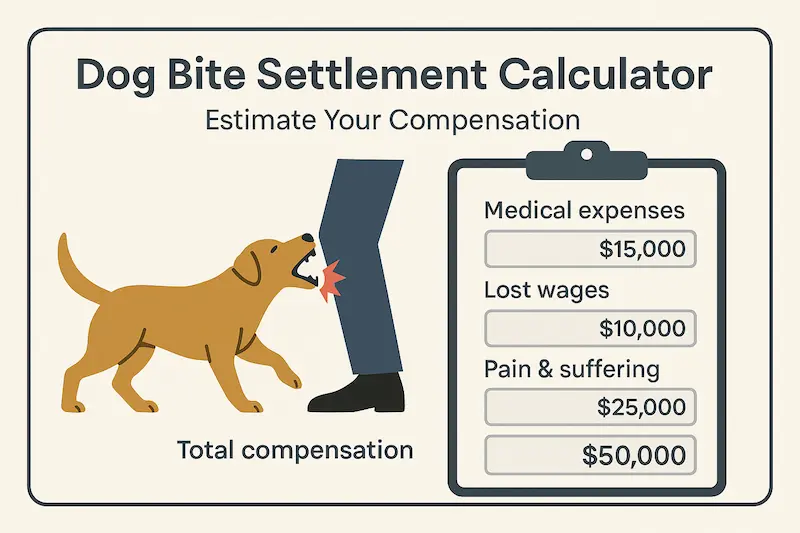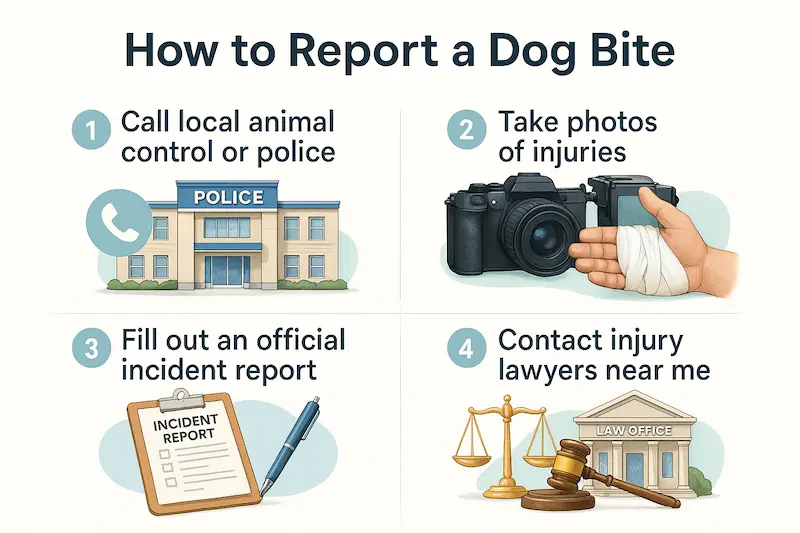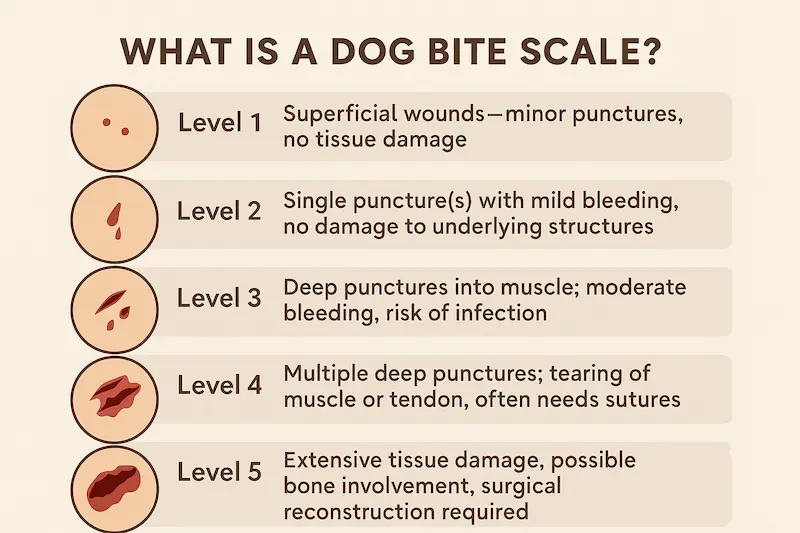Suffering a dog bite can leave you with painful injuries and mounting medical bills. If you’re asking yourself can I sue if a dog bites me or how to sue for a dog bite, you need a clear roadmap to pursue your claim. From filing a dog bite report to building a solid dog bite claim, this guide covers every phase so you can protect your rights and aim for fair dog bite compensation.
🚨 Understanding Your Rights After a Dog Bite
Before you jump into legal action, get familiar with key rules:
Grasping these basics lays the foundation for the rest of your dog bite lawsuit steps.
Gathering Evidence for Your Dog Bite Claim
Strong documentation makes a huge difference. Focus on collecting:
📸 Photos
Capture clear, well-lit images of the wounds and the attack location as soon as possible. Take close-ups with a scale reference (a coin or a ruler), wider shots that show context (street signs, gates, fences, warning signs), and multiple angles to document depth and spread. Preserve original files with timestamps and metadata, and keep any torn or bloodied clothing unwashed in a sealed bag as potential evidence.
📄 Medical Records
Assemble complete medical records, including doctor visits, treatments, and prescriptions. Request visit summaries, diagnostic findings, imaging, procedure notes, and invoices. Record pain levels, symptoms, and follow-up appointments; retain receipts for medications, dressings, and transportation. These documents help establish the causal link between the bite and your injuries.
🗣️ Witness Statements
Collect witness statements with full names and contact information. Ask witnesses to describe exactly what they saw, including date, time, distance, and conditions, and have them sign and date their statements when possible. Save any related texts, emails, or voice messages. Promptly documenting observations improves accuracy and credibility.
🔍 Animal Control Report
File or request an animal control report promptly. This official record typically includes the dog’s description, owner information, any prior incidents, and actions taken (such as quarantine). Obtain the case number and a certified copy for your file; agencies may update reports, so check back for supplements.
💉 Vaccination Status
Confirm and document the dog’s vaccination status, especially rabies. Request veterinary records or written confirmation from the owner. If the dog was unvaccinated or the status is unknown, note that explicitly; it can affect medical decision-making and may carry significant weight in court.
📁 Organize and Preserve
Keep everything in a secure, centralized file with clearly labeled digital copies and backups. Maintain a chronological timeline of events and communications. Having a well-organized packet makes it faster to prepare a claim and easier for counsel or insurers to evaluate your case.
Organize these items in a folder or secure digital file before you draft your dog bite claim.
Filing Your Legal Documents
Once evidence is in hand, start the formal process:
Draft a Demand Letter
- Outline injuries with dates and attach medical bills.
- State your compensation request clearly.
File a Complaint
Submit to your local court clerk—include owner’s name, dog description and incident date.
Serve the Defendant
Officially notify the dog owner per state rules.
Keep Records
Save every filing receipt, correspondence and court date notice.
These steps launch your dog bite lawsuit and signal you’re serious about seeking justice.
Navigating Court Procedures
Settlement Negotiations
Pre-trial talks: Insurance companies often prefer to settle before court to save costs and time. Mediation: A neutral mediator works with both sides to reach a fair agreement without going to trial.
Trial Preparation
Discovery: Exchange key documents, evidence, and written questions between parties. Depositions: Provide sworn testimony under oath. Expert witnesses: A dog bite specialist can clarify injury severity, medical impact, or canine behavior.
Court Appearance
On trial day, your attorney will present evidence, call witnesses, and argue for a fair dog bite compensation. Understanding each stage ahead of time helps reduce stress and prepares you for what’s next.
Maximizing Your Dog Bite Compensation
Build a complete, evidence-backed claim to maximize your dog bite compensation and strengthen settlement negotiations.
Document damage categories thoroughly
Save every bill and record for medical bills, lost wages, and pain and suffering. Use receipts, pay stubs, employer letters, and doctor notes to verify each loss.
Include future costs and long-term care
Factor in rehabilitation, physical therapy, counseling, surgeries, and long-term care. Ask providers for treatment plans and cost estimates to capture the full value of your claim.
Account for emotional distress and PTSD
Symptoms like anxiety, sleep issues, and PTSD after a dog attack are often compensable. Request formal diagnoses and therapy notes; they validate your non-economic damages.
Keep a daily journal to strengthen proof
Log pain levels, medications, sleep disruption, missed work, childcare issues, and activity limits. Specific, dated entries increase credibility and lead to higher settlement offers.
How much can I sue for a dog bite?
There’s no one-size-fits-all number. Strong liability proof, full medical documentation, clear lost income, and verified future care generally increase case value.
Common Pitfalls to Avoid

Avoiding costly mistakes can make the difference between winning fair compensation and having your claim dismissed. Missing critical reporting or filing deadlines can shut down your case before it begins, so always act quickly. Failing to report a dog bite to the police or animal control may leave you without official documentation, making it harder to prove what happened. Delaying medical care not only risks your health but also weakens your claim—insurance companies often argue that late treatment means the injury wasn’t serious. Speaking to insurance adjusters without legal counsel can lead to statements being used against you, reducing your settlement value. Finally, overlooking additional owner liability, such as negligent supervision or prior aggressive incidents, can leave significant compensation on the table. By addressing these issues early, you keep your dog bite personal injury claim on solid legal ground.




